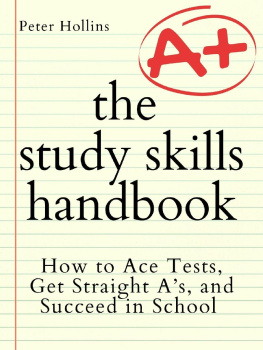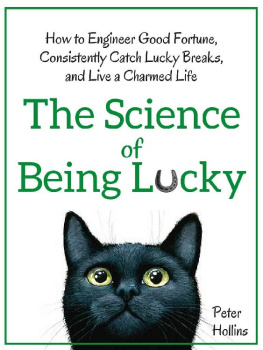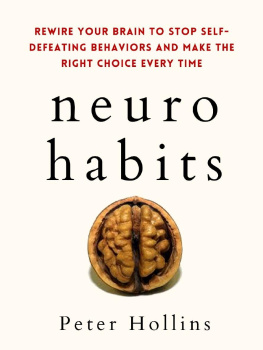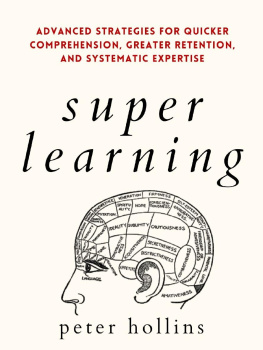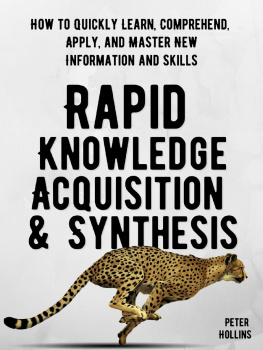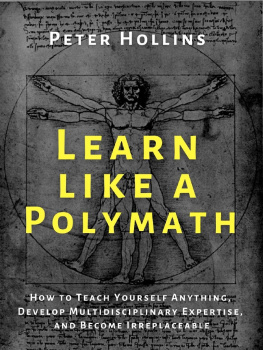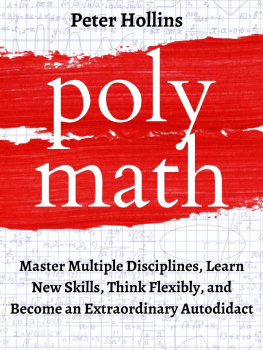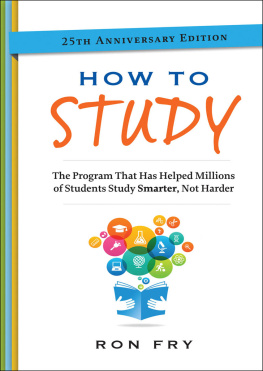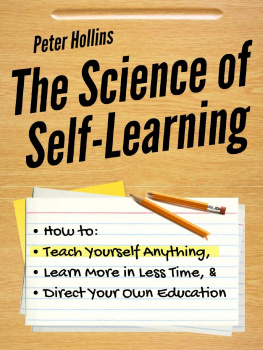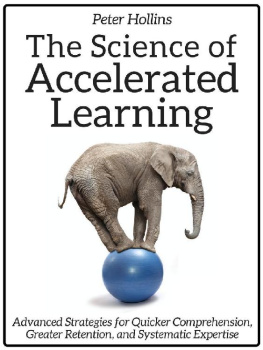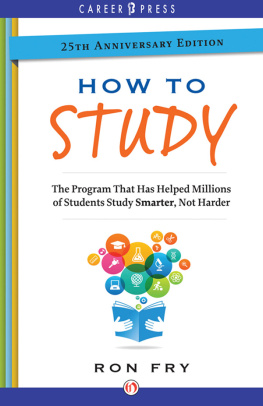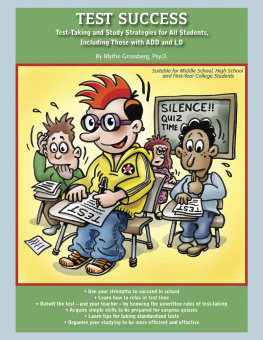Table of Contents
The Study Skills Handbook:
How to Ace Tests, Get Straight As, and Succeed in School
By Peter Hollins,
Author and Researcher at petehollins.com

CLICK HERE for your FREE 14-PAGE MINIBOOK: Human Nature Decoded: 9 Surprising Psychology Studies That Will Change the Way You Think. > >
--Subconscious Triggers
-- Emotional Intelligence
-- Influencing and Analyzing People

Table of Contents
Practicing Effective Listening During Class
Notetaking
Mind Maps
SQ3R
Teaching Others
The Learning Pyramid
The Protg Effect
Examples and Analogy Thinking
Blooms Taxonomy
Learning from Mistakes
Your Perfect Study Environment
Where to Study
When to Study
Studying is Not an Event; Its a Habit
Make a Study Plan
A Lifestyle that Supports Learning
Scientifically Proven Methods for Studying
Technique 1: Use Images
Technique 2: Create Mnemonics and Acronyms
Technique 3: Tell Stories
Technique 4: Mix Up Your Locations
Technique 5: Give Yourself Time to Digest
Technique 6: Chunking
Technique 7: Spaced Repetition
Technique 8: Practice Testing and Retrieval Practice
Have a Plan, Come Prepared
Multiple Choice Strategy
Essay Question Strategy
Conduct an Exam Postmortem
Types of Errors
Chapter 1. Making the Most of Classroom Time
Whether youre a school or university student or an adult learner, and no matter the subject youre tackling, you obviously appreciate the value of learning. But if youve picked up this book, you also understand that theres value in a kind of meta-learning, i.e. learning how to learn.
Isnt it strange how many of us simply take for granted the processes by which we learn new information? Maybe we think that good intentions, a bit of intelligence, and enough hard work are all it takes to succeed at our chosen study. While nobody would argue you dont need these things, the truth is that becoming good at learning seldom happens by accidentwe need to have a proven, practical strategy for exactly how were going to get the most out of the study process.
This is what this book is about. Were going to cover all those study skills that you werent taught at school but should have been. There will be a few familiar ideas in the chapters that follow (like how best to tackle tests, boost your memory, or draw up a study plan), but be prepared for a few unexpected ideas, too. The best thing is that even once youre done studying or aced your tests, the approaches and techniques that you learn here will continue to be useful to you all throughout life.
Lets start in the most obvious place: the classroom. One of the greatest study skills you could hope to master is listening. Youve heard it all before, but listening is not a passive process, and its definitely not the same as merely hearing. If up until now youve simply turned up to classes or lectures and sat down without a plan, well, youve been missing out. Listening is really a multi-stage process in which we receive, digest, and respond to the information that we hear.
So, how do you become a better listener? Well, that depends on how well youre currently absorbing and processing information at each level.
Practicing Effective Listening During Class
For our purposes, we can imagine that there are five stages in the listening process. Rather than sitting in the classroom and hoping that some knowledge will somehow magically float over to us, we have to see ourselves as engaged and aware information receptors.
The Reception Stage
Physiologically, the organs in your inner ear may be registering the sound waves and transmitting the information to your brain, but it all goes in one ear and out the other unless one crucial ingredient is present: your attention.
Your attention is what focuses your perception and shapes what youre perceiving into meaningful data that you can then store and remember. Often, when people think they have poor memories, the problem is that they never really attended in the first place. Well go more into the neuroscience details of learning later on, but for now, improving the receiving stage comes down to eliminating as many distractions and disruptions as possible, i.e. anything that threatens to interrupt your attention.
The Understanding Stage
What do the words youre hearing actually mean?
Comprehension happens continually in the listening process as the brain works hard to interpret context, infer meanings, and put together all the separate pieces of information into a coherent narrative they can actually do something with. Once you know the point the speaker is trying to make, you can frame and predict what else is said and see the bigger picture. Have you ever had the experience of hearing what someone said, understanding the individual words and sentences, but somehow still having zero clue what any of it meant or what larger framework it fit into? You were probably having difficulties at this stage!
We need to know the who, what, where, and, most importantly, why. We need to know not just the details of the message, but the purpose of it being communicated and what were supposed to do with that information. The best way to do this in the moment is to ask questions. As youre constructing your own mental representation of the speakers argument, you can actively seek to fill in any holeslearning is always best when teacher and learner can engage in a reciprocal dialogue.
The Evaluating Stage
Youre not just a sponge; you have opinions. You assess and evaluate what you hear, which is the first stage of producing your own original response to it. Evaluations can be done on many levelsyou can decide whether you agree or not, how well you think the argument itself has been made, whether you find the information significant to your life, or what you think about any biases or falsehoods in the content or delivery. You can also evaluate how well youve absorbed the material and whats still unclear for you.
As you listen, youre actively fitting in the new data alongside all the banked knowledge and understanding you already haveand possibly noticing any discrepancies or confirmations.
The Responding Stage
Once youve done this, its natural to have a reaction to what youve heard, and that includes thoughts, feelings, behaviors, or communication, both verbal and nonverbal. You could ask a question to deliberately guide the direction of the conversation or lesson, you could nod and smile, you could quietly decide youre not going to pay attention anymore, or you could actively take notes, adding in your own observations.
The Remembering Stage
You cant really be said to have learned something unless you are able to file it away well enough in your memory so that it can be retrieved again later. Memory is like a computer filing systemthe more clearly and deliberately you organize and tag your memories, the easier it will be to find and recall them later.
But youre actively using your memory even while youre listening, too. We use memory to fill in gaps as we listen, to retain information from the beginning of the lesson or even sentence, and to draw on what we already know to help us better comprehend the new material. Context doesnt just expand outward in the present moment, but reaches back into the past. Its only by using our memory that we can make logical connections and causal links, gaining proper insight into what were being told. This means that the solidity of what weve already remembered from previous lessons actively influences how well were learning and remembering the

